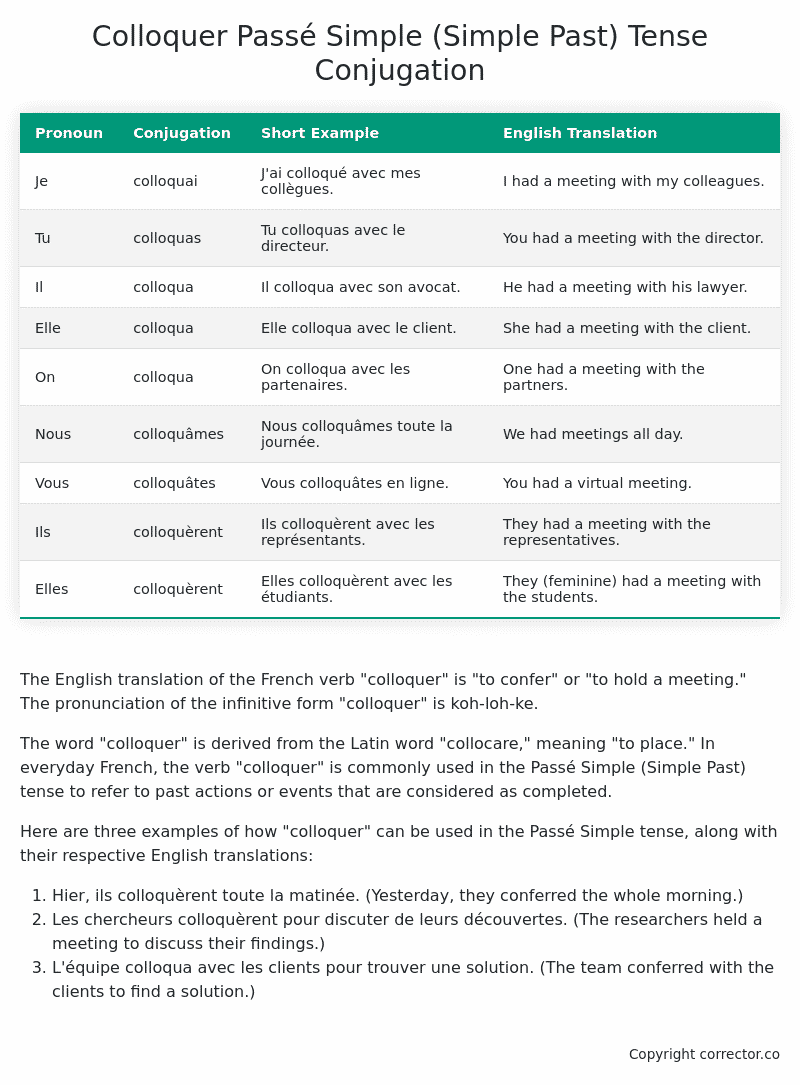Passé Simple (Simple Past) Tense Conjugation of the French Verb colloquer
Introduction to the verb colloquer
The English translation of the French verb “colloquer” is “to confer” or “to hold a meeting.” The pronunciation of the infinitive form “colloquer” is koh-loh-ke.
The word “colloquer” is derived from the Latin word “collocare,” meaning “to place.” In everyday French, the verb “colloquer” is commonly used in the Passé Simple (Simple Past) tense to refer to past actions or events that are considered as completed.
Here are three examples of how “colloquer” can be used in the Passé Simple tense, along with their respective English translations:
- Hier, ils colloquèrent toute la matinée.
(Yesterday, they conferred the whole morning.) - Les chercheurs colloquèrent pour discuter de leurs découvertes.
(The researchers held a meeting to discuss their findings.) - L’équipe colloqua avec les clients pour trouver une solution.
(The team conferred with the clients to find a solution.)
Table of the Passé Simple (Simple Past) Tense Conjugation of colloquer
| Pronoun | Conjugation | Short Example | English Translation |
|---|---|---|---|
| Je | colloquai | J’ai colloqué avec mes collègues. | I had a meeting with my colleagues. |
| Tu | colloquas | Tu colloquas avec le directeur. | You had a meeting with the director. |
| Il | colloqua | Il colloqua avec son avocat. | He had a meeting with his lawyer. |
| Elle | colloqua | Elle colloqua avec le client. | She had a meeting with the client. |
| On | colloqua | On colloqua avec les partenaires. | One had a meeting with the partners. |
| Nous | colloquâmes | Nous colloquâmes toute la journée. | We had meetings all day. |
| Vous | colloquâtes | Vous colloquâtes en ligne. | You had a virtual meeting. |
| Ils | colloquèrent | Ils colloquèrent avec les représentants. | They had a meeting with the representatives. |
| Elles | colloquèrent | Elles colloquèrent avec les étudiants. | They (feminine) had a meeting with the students. |
Other Conjugations for Colloquer.
Le Present (Present Tense) Conjugation of the French Verb colloquer
Imparfait (Imperfect) Tense Conjugation of the French Verb colloquer
Passé Simple (Simple Past) Tense Conjugation of the French Verb colloquer (You’re reading it right now!)
Passé Composé (Present Perfect) Tense Conjugation of the French Verb colloquer
Futur Simple (Simple Future) Tense Conjugation of the French Verb colloquer
Futur Proche (Near Future) Tense Conjugation of the French Verb colloquer
Plus-que-parfait (Pluperfect) Tense Conjugation of the French Verb colloquer
Passé Antérieur (Past Anterior) Tense Conjugation of the French Verb colloquer
Futur Antérieur (Future Anterior) Tense Conjugation of the French Verb colloquer
Subjonctif Présent (Subjunctive Present) Tense Conjugation of the French Verb colloquer
Subjonctif Passé (Subjunctive Past) Tense Conjugation of the French Verb colloquer
Subjonctif Imparfait (Subjunctive Imperfect) Tense Conjugation of the French Verb colloquer
Subjonctif Plus-que-parfait (Subjunctive Pluperfect) Tense Conjugation of the French Verb colloquer
Conditionnel Présent (Conditional Present) Tense Conjugation of the French Verb colloquer
Conditionnel Passé (Conditional Past) Tense Conjugation of the French Verb colloquer
Conditionnel Passé II (Conditional Past II) Tense Conjugation of the French Verb colloquer
L’impératif Présent (Imperative Present) Tense Conjugation of the French Verb colloquer
L’impératif Passé (Imperative Past) Tense Conjugation of the French Verb colloquer
L’infinitif Présent (Infinitive Present) Tense Conjugation of the French Verb colloquer
L’infinitif Passé (Infinitive Past) Tense Conjugation of the French Verb colloquer
Le Participe Présent (Present Participle) Tense Conjugation of the French Verb colloquer
Le Participe Passé (Past Participle) Tense Conjugation of the French Verb colloquer
Struggling with French verbs or the language in general? Why not use our free French Grammar Checker – no registration required!
Get a FREE Download Study Sheet of this Conjugation 🔥
Simply right click the image below, click “save image” and get your free reference for the colloquer Passé Simple tense conjugation!

Colloquer – About the French Passé Simple (Simple Past) Tense
Formation
Usage
Narration
Historical Context
Interactions with other tenses
Passé Composé
Imparfait
Conditional and Subjunctive
Summary
I hope you enjoyed this article on the verb colloquer. Still in a learning mood? Check out another TOTALLY random French verb conjugation!


